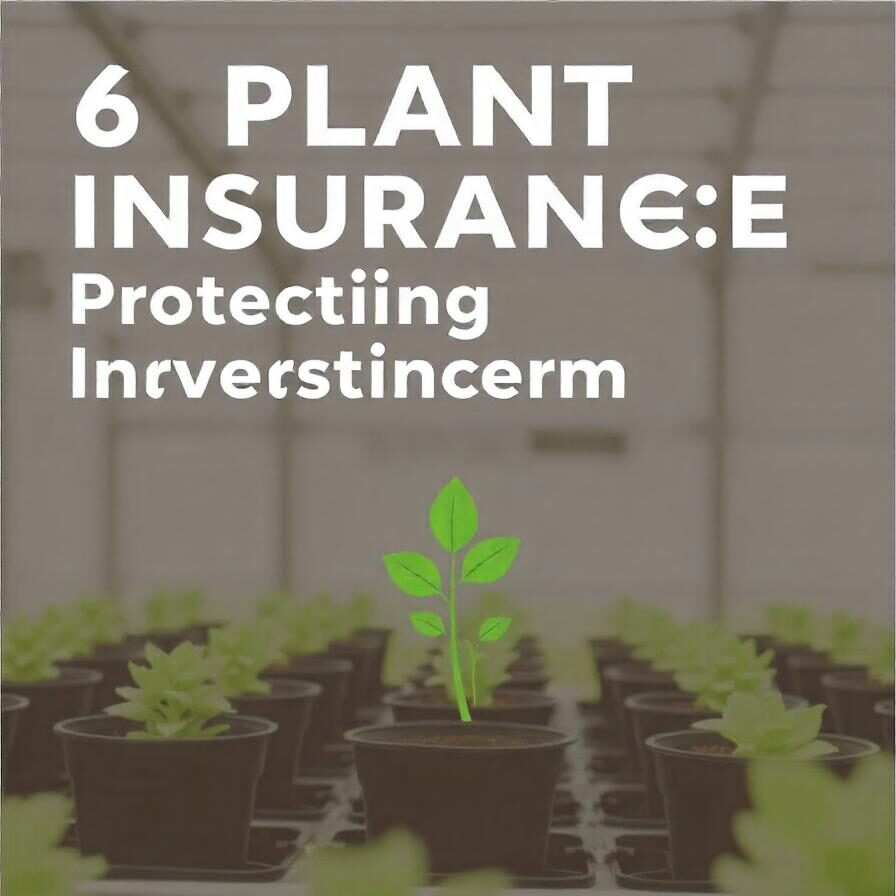Plant Insurance: Protecting Your Business Investment
In the fast-paced world of construction, manufacturing, and other industries that rely on heavy machinery, one thing is clear: equipment breakdowns can lead to significant financial setbacks. That’s where Plant Insurance comes in. Plant insurance is designed to cover a range of machinery and equipment used in various industries, offering protection against risks like damage, breakdown, and theft. This guide will walk you through everything you need to know about plant insurance, its benefits, and why it is crucial for your business.
Table of Contents

What is Plant Insurance?
Plant insurance provides coverage for various types of machinery and equipment, commonly referred to as “plant,” which is essential for construction, manufacturing, agriculture, and other industrial sectors. This type of insurance can cover mobile and stationary equipment, such as cranes, excavators, forklifts, generators, and more. Whether leased, hired, or owned, plant insurance is designed to safeguard your equipment against unforeseen risks that could lead to significant financial losses.
Types of Plant Insurance Coverage
There are several types of plant insurance policies available to suit the different needs of businesses. The primary types include:
- Hired-In Plant Insurance
- Hired-in plant insurance is specifically designed for businesses that hire or lease machinery from a third party. Since the equipment is not owned by your business, the leasing company will often require you to have insurance coverage for the duration of the hire. This type of insurance covers the cost of repairing or replacing the equipment if it is damaged, lost, or stolen while under your care.
- Owned Plant Insurance
- This policy covers equipment that is owned by your business. It provides protection against various risks, including accidental damage, fire, theft, vandalism, and more. This is crucial for businesses that rely on their own machinery for day-to-day operations.
- Contractors’ Plant Insurance
- Contractors’ plant insurance is designed for contractors and construction companies that use a variety of equipment at different job sites. It provides comprehensive coverage for both owned and hired equipment, protecting against damage, theft, and breakdowns.
- All Risks Plant Insurance
- An all-risks plant insurance policy offers broad coverage for a wide range of potential risks. This includes everything from accidental damage to theft, fire, and natural disasters. It is often the most comprehensive type of policy available, offering peace of mind to businesses with high-value machinery and equipment.
Why Do You Need Plant Insurance?
The cost of purchasing, leasing, or hiring heavy machinery can be significant. Without insurance, your business could face enormous financial losses if your equipment is damaged, stolen, or breaks down unexpectedly. Here are some key reasons why plant insurance is essential:
- Financial Protection: Plant insurance helps mitigate the financial risks associated with equipment damage, theft, or breakdown. The cost of replacing or repairing machinery can be prohibitive, especially for small and medium-sized businesses.
- Compliance Requirements: If you hire equipment, the rental company may require you to have insurance coverage as part of the hire agreement. Failing to secure the necessary coverage could leave you personally liable for any damages.
- Business Continuity: In the event of a machinery breakdown or theft, plant insurance ensures that your business can continue operating with minimal disruption. This is especially important for industries like construction, where delays can result in costly penalties.
- Peace of Mind: Knowing that your equipment is protected allows you to focus on running your business without worrying about unforeseen risks.
What Does Plant Insurance Typically Cover?
Plant insurance can cover a wide range of risks, depending on the type of policy you choose. Here are some common coverages included in most plant insurance policies:
- Accidental Damage: Coverage for unexpected damage to your equipment, such as from accidents or operator error.
- Theft: Protection against the theft of your machinery, whether it occurs on-site or during transportation.
- Fire Damage: Coverage for equipment damaged or destroyed by fire.
- Malicious Damage: Coverage for vandalism or deliberate damage to your machinery.
- Breakdown: Some policies offer coverage for mechanical breakdowns, which can be a lifesaver if your equipment requires costly repairs.
- Third-Party Liability: If your equipment causes damage to third-party property or injures someone, this coverage can help cover the legal costs and compensation.
Factors to Consider When Choosing a Plant Insurance Policy
When selecting a plant insurance policy, it’s essential to consider several factors to ensure that you have the right coverage for your business:
- Type of Equipment: Consider the type of machinery you use and whether it’s owned, leased, or hired. This will determine the type of coverage you need.
- Value of Equipment: The value of your equipment will impact the cost of your premium. Make sure you accurately assess the replacement cost of your machinery when taking out a policy.
- Scope of Coverage: Determine what risks are most relevant to your business. If you operate in high-risk areas or use your equipment for dangerous tasks, you may need broader coverage, such as an all-risks policy.
- Exclusions: Every insurance policy has exclusions, so it’s crucial to understand what is not covered by your plant insurance. This could include wear and tear, certain types of damage, or limits on coverage in specific locations.
- Policy Limits: Make sure the policy limits are sufficient to cover the full value of your equipment. Underinsuring your machinery could leave you facing substantial out-of-pocket expenses in the event of a claim.
How Much Does Plant Insurance Cost?
The cost of plant insurance varies depending on several factors, including the value of your equipment, the type of coverage you need, and the level of risk associated with your business. On average, premiums can range from a few hundred to several thousand dollars per year. However, the cost of insurance is a small price to pay compared to the potential financial losses that could result from an uninsured incident.
To get an accurate quote for your plant insurance, it’s essential to work with an experienced insurance broker who understands your industry and can tailor a policy to meet your specific needs.
Final Thoughts: Investing in Plant Insurance
Plant insurance is a crucial investment for any business that relies on heavy machinery and equipment. Whether you own, lease, or hire your plant, having the right insurance coverage can protect your business from costly setbacks and ensure continuity in the face of unforeseen risks. By understanding the different types of plant insurance available and selecting a policy that aligns with your needs, you can safeguard your business’s assets and focus on what you do best.
For a personalized quote or to learn more about how plant insurance can benefit your business, consider reaching out to a reputable insurance provider with expertise in your industry.
This article provides a comprehensive overview of plant insurance, explaining the various types of coverage, the importance of having insurance, and factors to consider when selecting a policy. This SEO-friendly content is designed to attract businesses searching for information on protecting their equipment and machinery investments.
